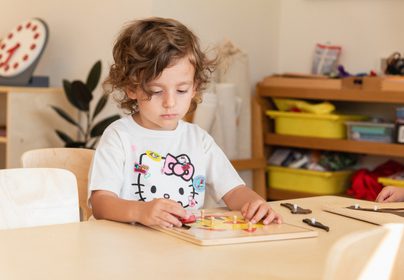Circle time is a treasured part of the Montessori daily routine, offering a special time when children gather together to learn about specific topics, share experiences, and build connections with one another.
In Montessori education, circle time is not merely a routine gathering—it is an intentional, dynamic session that fosters curiosity, empathy, and global awareness. When topics like countries, continents, and diverse cultures are introduced, circle time becomes a gateway to exploring the wider world. This communal learning experience is not only important for academic growth but also critical for children’s social-emotional development.
Circle time plays a pivotal role in establishing a sense of belonging in the classroom. It is a time when children come together as a group, fostering a sense of community and shared purpose. In Montessori philosophy, learning is not an isolated experience but a collaborative journey where each child’s perspective is valued.
When children learn about countries or continents during circle time, the sense of community extends beyond the classroom. They begin to see themselves as part of a global society, with other cultures, traditions, and ways of life that enrich their understanding. This broader perspective nurtures openness and respect for diversity from an early age.
Montessori classrooms are known for their calm, focused environments, and circle time serves as an anchor for developing concentration and attention. During these sessions, children practice listening to their teachers and peers, taking turns to speak, and engaging with the material presented. Learning about topics like continents or different countries requires focus, as the concepts are often introduced in ways that build on previous lessons.
By participating in circle time, children develop patience and attentiveness, learning that listening carefully helps them understand complex topics better. This focus translates into greater engagement in future academic learning, especially in topics that require exploration of cultures, languages, geography, and history.
Circle time in a Montessori classroom often includes storytelling, songs, and visual aids like maps or globe exploration, which make learning interactive and engaging. When introducing a topic like a country or a continent, teachers use these multi-sensory approaches to capture the children’s attention and spark curiosity.
Fostering Empathy and Respect for Different Cultures
In a Montessori classroom, education about the world is not just factual; it is deeply rooted in empathy and respect for diverse cultures and peoples. During circle time, when children learn about a specific country or continent, teachers introduce customs, traditions, and lifestyles of people from different parts of the world.
These discussions often highlight shared human values, such as family, celebration, or work, while also celebrating cultural uniqueness. This exposure to diversity at a young age fosters acceptance and empathy, helping children appreciate and value others for their differences. By building this foundation, children develop an inclusive mindset, viewing the world with curiosity and compassion.
Circle time in Montessori is not just about listening—it’s also about active participation. Children are encouraged to share their thoughts, ask questions, and sometimes even present what they’ve learned to the group. This environment builds self-confidence and social skills, as children learn to express themselves in a supportive setting.
When discussing a new topic like a country or continent, children might take turns to share something they know or relate it to personal experiences, like a family trip or a cultural celebration. This exchange of ideas nurtures confidence in speaking publicly and develops respect for others’ contributions, essential skills for future social interactions and academic success.
One of the most profound impacts of introducing topics like countries and continents during Montessori circle time is the early development of a global mindset. Children learn that the world is vast, diverse, and interconnected, and they gain a sense of belonging within this larger global family. This understanding is foundational in Montessori philosophy, as it encourages children to grow into responsible, compassionate global citizens.
In the Montessori method, circle time is not just a daily activity; it is a nurturing space where children build social-emotional skills, develop a love for learning, and foster curiosity about the world around them. When topics like countries and continents are introduced, circle time becomes a gateway to a larger world, cultivating a mindset that values connection, respect, and empathy.
Circle time in Montessori classrooms is, therefore, much more than a learning moment—it’s a foundation for a lifetime of openness, curiosity, and kindness.




